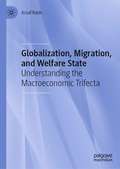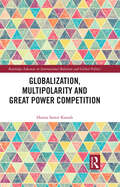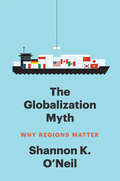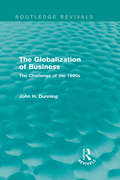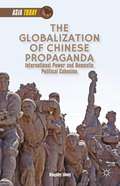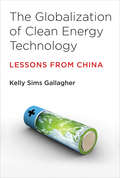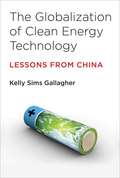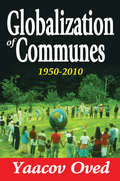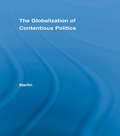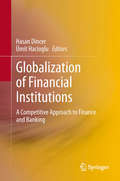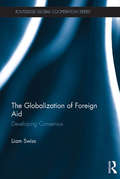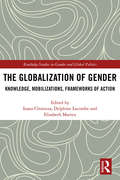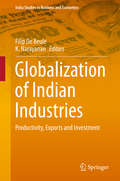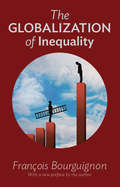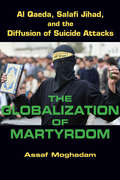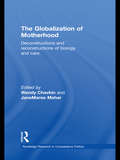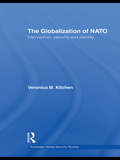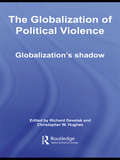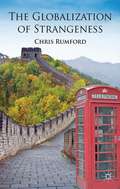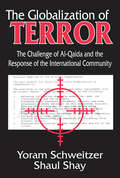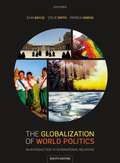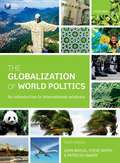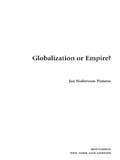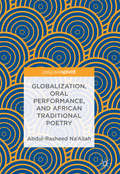- Table View
- List View
Globalization, Migration, and Welfare State: Understanding the Macroeconomic Trifecta
by Assaf RazinThis book is about three key dimensions in economics—globalization, migration and the welfare state—that are of enduring interest. These issues are particularly important to consider at the present moment given the strains posed by the pandemic: there is at least a temporary setback to trade-globalization and migration, and the cost of fighting the pandemic will strain the ability of governments to provide welfare state services in a style and scope to which many of their citizens have become accustomed. The book explains the changing function of the welfare state in the presence of intensified globalization, or de-globalization, forces. The welfare state’s policy-maker attitudes toward openness and migration depend on open-economy fundamentals, and the income class it represents. The author demonstrates the interactions between migration, globalization and macroeconomic policy in practice, using real-world unique episodes, with Israel deemed as well-functioning trifecta, and the US and Europe as imperfectly functioning trifecta.
Globalization, Multipolarity and Great Power Competition (Routledge Advances in International Relations and Global Politics)
by Hanna Samir KassabIn his new book, Hanna Samir Kassab examines changes and trends in international politics and the competition between great powers for control of the international system. He argues that the increase in geopolitical, economic, nationalist, and resource competition between three great powers, the United States, China, and Russia, points to the changing structure of the international system. This competition is a systemic one, focusing more on the rules and norms that defined the system since the end of the Cold War. This American-led unipolar order is translating into a multipolar one. Kassab begins by tracing the decline of the United States after the Iraq War (2003) and the Great Recession (2008) as well as the rise of China and the resurgence of Russia. He describes major foreign policy changes from George H.W. Bush to Donald J. Trump and how the various administrations approached the international system. This explains that while the United States pulls-back from the international system, China and Russia are seeking to increase their influence. Written using simple jargon and defines terms whenever necessary, Globalization, Multipolarity and Great Power Competition is equally accessible to academics and casual readers and lay-people interested in international politics.
The Globalization Myth: Why Regions Matter (Council on Foreign Relations Books)
by Shannon K O'NeilA case for why regionalization, not globalization, has been the biggest economic trend of the past forty years The conventional wisdom about globalization is wrong. Over the past forty years as companies, money, ideas, and people went abroad more often than not, they looked regional rather than globally. O&’Neil details this transformation and the rise of three major regional hubs in Asia, Europe, and North America. Current technological, demographic, and geopolitical trends look only to deepen these regional ties. O'Neil argues that this has urgent implications for the United States. Regionalization has enhanced economic competitiveness and prosperity in Europe and Asia. It could do the same for the United States, if only it would embrace its neighbors.
The Globalization of Business: The Challenge of the 1990s (Routledge Revivals)
by John H DunningIn recent years economic activity has become increasingly globalized. One of the main instruments behind this process is the multinational enterprise. In The Globalization of Business, first published in 1993, John Dunning explores the latest issues in the world of international business and looks ahead at the remaining years of this century identifying the likely challenges of the future. What are the challenges posed by the technological, political and economic developments of the 1990s for international business? What are the implications of the opening up of new territories such as in Central and Eastern Europe and parts of China? To what extent are the competitive advantages of nation states increasingly coming to depend on the presence of multinational activity? What are the implications of the globalization of markets and production for the domestic economic policies of governments? This collection of essays will be vital reading to students of international business.
The Globalization of Chinese Propaganda
by Kingsley EdneyThis book investigates the relationship between the Chinese Communist Party's crucial goal of using the propaganda system to consolidate its power within the domestic political environment and its prominent recent attempts to use propaganda overseas to increase China's international power.
The Globalization of Clean Energy Technology: Lessons from China (Urban and Industrial Environments)
by Kelly Sims GallagherAn examination of barriers that impede and incentives that motivate the global development and deployment of cleaner energy technologies, with case studies from China. The development and deployment of cleaner energy technologies have become globalized phenomena. Yet despite the fact that energy-related goods account for more than ten percent of international trade, policy makers, academics, and the business community perceive barriers to the global diffusion of these emerging technologies. Experts point to problems including intellectual property concerns, trade barriers, and developing countries' limited access to technology and funding. In this book, Kelly Gallagher uses analysis and case studies from China's solar photovoltaic, gas turbine, advanced battery, and coal gasification industries to examine both barriers and incentives in clean energy technology transfer.Gallagher finds that the barriers are not as daunting as many assume; these technologies already cross borders through foreign direct investment, licensing, joint R&D, and other channels. She shows that intellectual property infringement is not as widespread as business leaders fear and can be managed, and that firms in developing countries show considerable resourcefulness in acquiring technology legally. She finds that financing does present an obstacle, especially when new cleaner technologies compete with entrenched, polluting, and often government-subsidized traditional technologies. But the biggest single barrier, she finds, is the failure of government to provide sensible policy incentives. The case studies show how government, through market-formation policy, can unleash global market forces. Gallagher's findings have theoretical significance as well; she proposes a new model of global technology diffusion that casts doubt on aspects of technology transfer theory.
The Globalization of Clean Energy Technology
by Kelly Sims GallagherThe development and deployment of cleaner energy technologies have become globalized phenomena. Yet despite the fact that energy-related goods account for more than ten percent of international trade, policy makers, academics, and the business community perceive barriers to the global diffusion of these emerging technologies. Experts point to problems including intellectual property concerns, trade barriers, and developing countries' limited access to technology and funding. In this book, Kelly Gallagher uses analysis and case studies from China's solar photovoltaic, gas turbine, advanced battery, and coal gasification industries to examine both barriers and incentives in clean energy technology transfer. Gallagher finds that the barriers are not as daunting as many assume; these technologies already cross borders through foreign direct investment, licensing, joint R&D, and other channels. She shows that intellectual property infringement is not as widespread as business leaders fear and can be managed, and that firms in developing countries show considerable resourcefulness in acquiring technology legally. She finds that financing does present an obstacle, especially when new cleaner technologies compete with entrenched, polluting, and often government-subsidized traditional technologies. But the biggest single barrier, she finds, is the failure of government to provide sensible policy incentives. The case studies show how government, through market-formation policy, can unleash global market forces. Gallagher's findings have theoretical significance as well; she proposes a new model of global technology diffusion that casts doubt on aspects of technology transfer theory.
Globalization of Communes: 1950-2010
by Yaacov OvedAfter World War II, communes and cooperative communities became internationally oriented in their membership and networking began to develop. Unlike earlier such enterprises, these groups shared an openness to international relationships. This was evident both in the groups' social composition, and in the extension of networks beyond their own country. Such globalization opened up the possibility of comparative analysis, which has become a trend in research since the 1950s. The dynamism and speed with which voluntary communities have spread throughout the world is impressive. In the 1950s there were only a few hundred such societies, but by the end of the last century there were thousands. These have taken a variety of forms. There are religious and secular communes, intentional communities, ecological communities, co-housing projects, various types of Christian communities, communities of Eastern religions, and spiritual communities inspired by New Age thought. Yaacov Oved shows that such societies maintain a community based on cooperation and expand their influence through newspapers, television, and the Internet. Their chief characteristic is their openness to the outside world, and their search for a way to move beyond a world of individualism and competitiveness. To accomplish this, they embrace all the tools of the modern world. Oved observes that those who predicted the failure of communes and intentional communities failed to appreciate the extent to which people in today's society aspire to communal life. This book answers the doubters and does so with a sense of deep historical understanding.
The Globalization of Contentious Politics: The Amazonian Indigenous Rights Movement (Indigenous Peoples and Politics)
by Pamela MartinThis dissertation argues that Amazonian indigenous peoples organized via transnational networks due to the domestic blockages presented to them in their respective countires. Due to these blockages and the growing number of transnational political opportunity structures, such as national and international non-govermental organizations, multi-lateral development banks, and multinational corporation, indigenous peoples mobilized through transnational advocacy networks and eventually formed transnational social movement organizations. Through a comparative-historical analysis of five Ecuadorian Amazonian indigenous organizations, this work illustrates the processes of transnational collective action and its outcomes.
Globalization of Financial Institutions
by Hasan Dincer Ümit HaciogluThis peer-reviewed volume from the Society for the Study of Business and Finance, discusses current issues in globalization and financial system from an international political and economic perspective. Contemporary instruments and actors in the global financial system are specially analyzed and the discussion of managerial and financial issues of the global financial strategies offers novelty to readers and researchers in the field.
The Globalization of Foreign Aid: Developing Consensus (Routledge Global Cooperation Series)
by Liam SwissWhy do aid agencies from wealthy donor countries with diverse domestic political and economic contexts arrive at very similar positions on a wide array of aid policies and priorities? This book suggests that this homogenization of policy represents the effects of common processes of globalization manifest in the aid sector. Drawing on both quantitative and qualitative analysis of policy adoption, the book argues that we need to examine macro-level globalizing influences at the same time as understanding the micro-level social processes at work within aid agencies, in order to adequately explain the so-called ‘emerging global consensus’ that constitutes the globalization of aid. The book explores how global influences on aid agencies in Canada, Sweden, and the United States are mediated through micro-level processes. Using a mixed-methods approach, the book combines cross-national statistical analysis at the global level with two comparative case studies which look at the adoption of common policy priorities in the fields of gender and security. The Globalization of Foreign Aid will be useful to researchers of foreign aid, development, international relations and globalization, as well as to the aid policy community.
The Globalization of Gender: Knowledge, Mobilizations, Frameworks of Action (Routledge Studies in Gender and Global Politics)
by Elisabeth Marteu Ioana Cîrstocea Delphine LacombeThis book provides an insightful approach to understanding the contemporary circulations of feminist repertoires and shows how the international/transnational circulations of gender are interconnected, even coextensive, with the globalization process itself. Fed by a shared reflexivity on relations among activist groups, state institutions, and international actors involved in the production and dissemination of contemporary norms dealing with gender, each chapter shares methodological premises and studies the circulation of gender-related norms and knowledge in situ and by varying standpoints. Specifically, the authors de-compartmentalize the academic disciplines and go beyond classical geographic divisions, in order to map social spaces and networks of actors involved in the production and circulation of gender-related repertoires. Last, the book grasps circulatory processes and entangled social phenomena, which are usually subject to disciplinary and thematic divisions separating collective action and public action, development aid and feminism, law and international relations. Focused on collective and individual experiences within women’s organizations, activist careers, unstable mobilizations, public policies temporalities, the chapters reveal the mechanisms through which these arrangements are made and shed light on strategies deployed by actors rooted in specific social and political contexts. This book will be of key interest to students and scholars of gender studies and more broadly to politics, International Relations, sociology, geography, history, and anthropology.
The Globalization of Higher Education
by Christine T. Ennew David GreenawayA volume of specially commissioned papers which draws on the diverse expertise of academic researchers, policy makers and educational practitioners to address the changing patterns of competition and provision, in international higher education. Topics addressed range from policy, provision, teaching, research and business engagement.
Globalization of Indian Industries
by Filip De Beule K. NarayananThis book focuses on Indianmanufacturing industries and analyses the impact of inward foreign directinvestment on the domestic sector on the one hand, and exports and outwardforeign direct investment by Indian companies on the other. Although theemphasis is mostly general, specific industries, such as the automotiveindustry or the wind energy sector are also explored. The differences between lowand high technology industries are also addressed. In terms of theoretical settingand analysis, the book draws both from international business and industrial organizationliterature. The various characteristics of Indian industries, such as thedeterminants and impacts of R&D, the effects of spillovers, the drivers ofproductivity and technical efficiency are thoroughly researched employingappropriate quantitative methodologies that are relevant to the specific domainand topic under investigation. The book also focuses on the bearing ofpolicy on promoting manufacturing industries in India and is therefore ofinterest to researchers, industrialists and policy makers alike.
The Globalization of Inequality
by François Bourguignon Thomas Scott-RailtonIn The Globalization of Inequality, distinguished economist and policymaker François Bourguignon examines the complex and paradoxical links between a vibrant world economy that has raised the living standard of over half a billion people in emerging nations such as China, India, and Brazil, and the exponentially increasing inequality within countries. Exploring globalization's role in the evolution of inequality, Bourguignon takes an original and truly international approach to the decrease in inequality between nations, the increase in inequality within nations, and the policies that might moderate inequality's negative effects.Demonstrating that in a globalized world it becomes harder to separate out the factors leading to domestic or international inequality, Bourguignon examines each trend through a variety of sources, and looks at how these inequalities sometimes balance each other out or reinforce one another. Factoring in the most recent economic crisis, Bourguignon investigates why inequality in some countries has dropped back to levels that have not existed for several decades, and he asks if these should be considered in the context of globalization or if they are in fact specific to individual nations. Ultimately, Bourguignon argues that it will be up to countries in the developed and developing world to implement better policies, even though globalization limits the scope for some potential redistributive instruments.An informed and original contribution to the current debates about inequality, this book will be essential reading for anyone who is interested in the future of the world economy.
The Globalization of Martyrdom: Al Qaeda, Salafi Jihad, and the Diffusion of Suicide Attacks
by Assaf Moghadam2009 Outstanding Academic Title, ChoiceThis groundbreaking volume examines the rise and spread of suicide attacks over the past decade. Sorting through 1,270 terror strikes between 1981 and 2007, Assaf Moghadam attributes their recent proliferation to the mutually related ascendance of al Qaeda and its guiding ideology, Salafi Jihad, an extreme interpretation of Islam that rejects national boundaries and seeks to create a global Muslim community. In exploring the roots of the extreme radicalization represented by Salafism, Moghadam finds many causes, including Western dominance in the Arab world, the physical diffusion of Salafi institutions and actors, and the element of opportunity created by the Soviet invasion of Afghanistan. He uses individual examples from the Middle East, Southwest Asia, and Europe to show how the elite leaders of al Qaeda and affiliated groups and their foot soldiers interact with one another and how they garner support—and a growing number of converts and attackers—from the Muslim community. Based on over a decade of empirical research and a critical examination of existing thought on suicide attacks, Moghadam distinguishes the key characteristics separating globalized suicide strikes from the traditional, localized pattern that previously prevailed.This unflinching analysis provides new information about the relationship between ideology and suicide attacks and recommends policies focused on containing Salafi Jihadism.
The Globalization of Motherhood: Deconstructions and reconstructions of biology and care (Routledge Research in Comparative Politics)
by Wendy ChavkinThe convergence of dramatic declines in birth rates worldwide, aside from sub-Saharan Africa, the rise of untrammelled global movement of capital, people and information, and the rapid-fire dissemination of a host of new medical technologies has led to the "globalization of motherhood". This book brings together research from the Global North and the Global South to illuminate how contemporary motherhood is being changed by the processes of globalization. It locates declining fertility and desire for motherhood in the context of female employment, the development of the global market in reproductive technologies, the rising transnational labour market demand for feminized carework, and changing family forms. Focusing on the impacts on women who mother- and enable others to do so- across diverse contexts, the book examines the way in which conception, gestation mothering labor and care are being mobilized across national boundaries. Bringing together demographers, sociologists, lawyers, public health and social theorists, this book will be of interest to students and scholars of globalization studies, development studies, gender studies, feminist politics, political economy, human rights, and social policy.
The Globalization of NATO: Intervention, Security and Identity (Routledge Global Security Studies)
by Veronica M. KitchenThis book examines NATO’s transition from a Cold War mutual defence organization into a global alliance, and puts the recent crisis over the Afghanistan mission in the context of long-standing debates over out-of-area interventions. Originally, NATO bound the western allies together for the purposes of mutual defence as defined by Article 5 of the North Atlantic Treaty, which declared that an attack on the territory of one ally was to be considered an attack on them all. However, Article 4 of the Treaty invites the allies to consult with each other on a less formal basis whenever their 'territorial integrity, political independence, or security' was threatened, without the automatic commitment to a shared response. During the Cold War, the allies consulted both formally and informally on issues beyond mutual defence in debates that were, more often than not, extremely contentious. After the Cold War, these out-of-area missions became the primary focus of NATO’s military missions. The allies had to debate the scope of co-operation for every mission they considered undertaking collectively. This book argues that NATO’s identity has changed from a Cold War mutual defence organization to a global alliance in the course of debates over how to respond to the changing circumstances of its security environment. This book will be of much interest to students of security studies, international organisations, contemporary history and IR in general.
The Globalization of Political Violence: Globalization's Shadow (Routledge Studies in Globalisation #Vol. 10)
by Richard Devetak Christopher W. HughesThe events of the 11th of September 2001 revealed most dramatically that globalization has a shadow. While large sections of the world’s population enjoy the perceived benefits of globalization, others seek to utilize globalization for their own politically violent purposes. If 9/11 demonstrated anything, it is that globalization can as readily facilitate violence and insecurity as it can produce stability, prosperity and political order. This edited volume offers important new methodological and multi-disciplinary insights into the study of globalization and political violence. It brings together studies from various disciplines in order to address the precise nature of the relationship between globalization and political violence as it seeks to offer new theoretical and empirical understandings of the types of actors involved in political violence, either as perpetrators or victims. Examples of the studies include the changing character of state militaries and state-to-state conflict under globalization, the emergence of ‘new wars’ fuelled by globalization, the role of state militaries in intervention, new forms of violence directed by states against refugees and anti-globalization protesters, the role of terrorist actors post-9/11, networks for the proliferation of weapons of mass destruction and the rise of private military firms amongst others. The Globalization of Political Violence will be of interest to students and researchers of politics, international relations, security studies and international political economy.
The Globalization of Strangeness
by Chris RumfordThe figure of the stranger is in serious need of revision, as is our understanding of the society against which the stranger is projected. Under conditions of globalization, inside/outside markers have been eroded and conventional indicators of 'we-ness' are no longer reliable. We now live in a generalized state of strangeness, one consequence of globalization: we no longer know where our community ends and another one begins. In such circumstances it is often the case that neighbours are the nearest strangers. Strangeness occurs when global consciousness outstrips global connectivity and this means that we need to rethink some core elements of globalization theory. Under conditions of strangeness the stranger is a 'here today, gone tomorrow' figure. This book identifies the cosmopolitan stranger as the most significant contemporary figure of the stranger, one adept at negotiating the 'confined spaces' of globalization in order to promote new forms of social solidarity and connect with distant others.
The Globalization of Terror: The Challenge of Al-Qaida and the Response of the International Community
by Shaul ShayThe terrorist destruction of the World Trade Center on September 11, 2001 was the climax of a course plotted by Osama Bin Laden to bring about his apocalyptic vision of a decisive clash between the Western and Moslem worlds. This timely volume details the organizational workings and belief system of Bin Laden's brutal campaign. The authors explore the background and objectives of the attacks, the elaborate planning that went into them, and the process of their practical execution.In addition to its factual account, The Globalization of Terror makes a significant contribution to scholarly and theoretical research dealing with international terror. The book offers a unique analysis of the Afghan "alumni," who had previously fought the Soviets in the 1980s, within the overall tapestry related to modern international terror. The authors detail how their activities evolved from a movement of national self-defense to the militant worldview identified with radical Islam. The book reveals, as well, the organizational structure so carefully erected by Bin Laden and his associates, in order to realize the vision of a worldwide Islamic Caliphate in practical terms. The book is intended to work as a set of guidelines for newcomers to the world of international terrorism including anti-terror task forces, heads of security companies as well as professionals in the field.The importance of The Globalization of Terror lies in its clear presentation and precise analysis regarding the dimensions of the danger international terror poses to the free world, and in its recommendations for the necessary strategy to prevent the recurrence of acts of large-scale terror.
The Globalization of World Politics: An Introduction to International Relations
by John Baylis Patricia Owens Steve SmithTrusted by over 300,000 students in over 120 countries, The Globalization of World Politics is the most authoritative and complete introduction to IR available, making it the go-to text for students of International Relations. Now in its sixth edition, this internationally successful textbook has been fully revised and updated in light of recent developments in world politics, featuring 35 new international case studies including: the BRICs, Gaza Freedom Flotilla, Sudanese civil war, drones, Fukushima Daiichi nuclear disaster, rise of China, Occupy movement, and Syrian Revolution. A new chapter by Andrew Hurrell on rising powers and the emerging global order ensures the text continues to cover topics that will be defining the issues now and for the next generation. The unique line-up of expert contributors introduces students to the very best work within history, theory, structures, and key issues in International Relations, providing a launch-pad for those who choose to progress with their IR studies. Students and lecturers are further supported by a well-resourced Online Resource Centre with the following features: Student resources: Mind maps NEW TO THIS EDITION Case studies MORE ADDED Video podcasts from the contributors NEW TO THIS EDITION Interactive library of links to journal articles, blogs and video content Flash card glossary Multiple choice questions Revision guide Instructor Resources: Case studies MORE ADDED Test bank Question bank PowerPoint slides REVISED Figures and tables from the book
The Globalization of World Politics: An introduction to International Relations, Sixth Edition
by John Baylis Steve Smith Patricia OwensWorking from a unique non-U.S. perspective, this market-leading text provides a coherent, accessible, and engaging introduction to the globalization of world politics. Now in its sixth edition, The Globalization of World Politics has been fully revised and updated in light of recent developments in world politics.
Globalization or Empire?
by Jan Nederveen PieterseIn this smart and concise examination of the trends driving contemporary globalization, Jan Nederveen Pieterse argues that the United States' pursuit of global primacy is based upon a complex melding of neoliberal economics and hegemonic politics. Do alternate capitalisms offer viable alternatives to the American way? Globalization or Empire? looks at globalization with acuity and thoughtfulness and uncovers its underlying dramas.
Globalization, Oral Performance, and African Traditional Poetry
by Abdul-Rasheed Na’AllahThis book discusses globalization trends and influences on traditional African oral literary performance and the direction that Ilorin oral art is forced to take by the changes of the twenty-first century electronic age. It seeks a new definition of contemporary African bourgeois in terms of its global reach, imitation of foreign forms and collaboration with the owners of the primary agencies. Additionally, it makes a case that African global lords or new bourgeoisie who are largely products of the new global capital and multinational corporations’ socio-political and cultural influences fashion their tastes after western cultures as portrayed in the digital realm.
